Politique de critique: seulement les meilleurs des
nouvaux disques que nous reçevons chaque mois sont abordés ici. Nous critiquons tous les
bons DC que nous recevons, mais nous ne reçevons pas toutes les nouveautés. Donc si une
nouveauté n’est pas mentionnée, cela ne veut pas dire qu’elle est inférieure.
Review Policy: We review all the good CDs we get, but we don’t get
every new release. Only the very best of the new recordings we receive each month are
reviewed in the printed version of LSM. If a new release is not mentioned in print, it
does not imply it is inferior. You will find many more CD reviews on our website ( http://www.scena.org ).
| **** |
Excellent |
| *** |
Yes / Oui |
| ** |
Maybe /
Peut-être |
| * |
No / non |
| $ |
< $10 |
| $$ |
$10-15 |
| $$$ |
$15-20 |
| $$$$ |
>$20 |
Mozart : Don Giovanni
Claudio Abbado / Chamber Orchestra of Europe
Deutsche Grammophon 457-601-2
** $$$
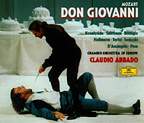 Abbado’s new Don Giovanni was recorded in
January-February 1997 in Ferrara’s Teatro Communale at the time of live performances.
The chamber orchestra produces superbly refined sounds but, from the overture on,
Abbado’s conducting is only sporadically dramatic, lacking propulsive force and
narrative continuity. The star of the show is Welsh baritone Bryn Terfel in his first
recorded Leporello - much less overacted than his Don Giovanni with Solti. His sniffs,
laughs and sneers make the character come vividly alive. Ildebrando
D’Arcangelo’s plummy baritone makes an excellent Masetto, assertive enough to
play the Don or Leporello.Finnish soprano Soile Isokoski makes a fine Donna Elvira,
expressing both the shrewish and vulnerable sides of her character. Patricia Pace’s
Zerlina is excellent -- saucy, expressive, feminine but not feeble. The rest of the cast
is merely adequate. Bref, a good recording for half the cast and for orchestral sound, but
not for overall dramatic impact. Abbado’s new Don Giovanni was recorded in
January-February 1997 in Ferrara’s Teatro Communale at the time of live performances.
The chamber orchestra produces superbly refined sounds but, from the overture on,
Abbado’s conducting is only sporadically dramatic, lacking propulsive force and
narrative continuity. The star of the show is Welsh baritone Bryn Terfel in his first
recorded Leporello - much less overacted than his Don Giovanni with Solti. His sniffs,
laughs and sneers make the character come vividly alive. Ildebrando
D’Arcangelo’s plummy baritone makes an excellent Masetto, assertive enough to
play the Don or Leporello.Finnish soprano Soile Isokoski makes a fine Donna Elvira,
expressing both the shrewish and vulnerable sides of her character. Patricia Pace’s
Zerlina is excellent -- saucy, expressive, feminine but not feeble. The rest of the cast
is merely adequate. Bref, a good recording for half the cast and for orchestral sound, but
not for overall dramatic impact.
Ernest Chausson : Symphony in B flat Op. 20
Jérôme Kaltenbach / Orchestre Symphonique et Lyrique de Nancy.
Naxos 8.553652
PPP $
Conductor Kaltenbach gives this familiar French repertoire a lushly
operatic reading, not surprising since he is the director of the Opéra de Nancy. The
orchestra is responsive, professional and idiomatic. French violinist Laurent Korcia
delivers a very fine performance of Chausson’s Poème. Historical note: this
recording was made in the Salle Poirel (Nancy, France) where Ysa
Mahler : Das Lied von Der Erde
James Levine / Berlin Philharmoniker
Deutsche Grammophon 439-9948-2
** $$$
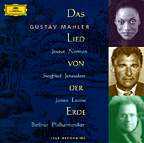 This live recording (interrupted by only one
tiny cough) dates back to a live 1992 performance in the Berlin Philharmoniker's home
auditorium. The Grosser Saal is not the best recording location in the world. On this
disc, the singers sound much closer than the orchestra. Levine keeps the orchestra down,
giving the two soloists breathing space. Tenor Siegfried Jerusalem, now at the end of his
Wagnerian career, certainly needs the help. The killer tessitura of the role finds him
pushed to his vocal limits and his bellowing in "Der Trunkene im Frühling" is
tiresome. Jessye Norman, on the other hand, sounds fine, though slightly less plush than
in her prime. Her rich hybrid mezzo-soprano/soprano (call it mezzprano) voice creates a
unique atmosphere. Levine’s conducting tends to be slow, and his Berlin
Philharmoniker excels in sound effects rather than a visionary reading. This live recording (interrupted by only one
tiny cough) dates back to a live 1992 performance in the Berlin Philharmoniker's home
auditorium. The Grosser Saal is not the best recording location in the world. On this
disc, the singers sound much closer than the orchestra. Levine keeps the orchestra down,
giving the two soloists breathing space. Tenor Siegfried Jerusalem, now at the end of his
Wagnerian career, certainly needs the help. The killer tessitura of the role finds him
pushed to his vocal limits and his bellowing in "Der Trunkene im Frühling" is
tiresome. Jessye Norman, on the other hand, sounds fine, though slightly less plush than
in her prime. Her rich hybrid mezzo-soprano/soprano (call it mezzprano) voice creates a
unique atmosphere. Levine’s conducting tends to be slow, and his Berlin
Philharmoniker excels in sound effects rather than a visionary reading.
Tchaikovsky : Symphony No. 5
Glazunov : Violin Concerto
Stokowski / London Symphony & London Philharmonic Orchestras
Phase 4 Stereo. London 455-157-2
*** $$$
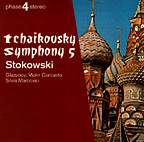 Decca / London’s 1962 introduction of
“Phase 4 Stereo” was an exciting innovation for hi-fi buffs. Using the latest 10
and 20 channel mixers, Decca engineers gave the orchestral sound a sense of shifting
movement and depth. The “Phase 4” repertoire tended to “sound
spectaculars,” heavy on brass and percussion and the big romantic overtures and
symphonies. Today all this tomfoolery has been banished to the movie theatre, so one
listens to these wild stereo experiments with a sense of forbidden pleasure. The
Tchaikovsky Symphony No. 5 was recorded in a German castle in 1966. The vigour and
massiveness of the sound is stunning, a revelation after years of anemic but politically
correct modern orchestral playing. The occasionfor the Glazunov Violin Concerto was
Stokowski’s 90th birthday concert in 1972 at the Royal Festival Hall, so the live
sound is less controlled and a bit shriller than the Tchaikovsky symphony. The concerto is
played with predictable Romantic indulgence by Romanian violinist Sylvia Marcovici. What
fun to revel in the sheer tasteless exuberance of Stokowski’s Sturm und Drang und
Schmaltz after all these years. Decca / London’s 1962 introduction of
“Phase 4 Stereo” was an exciting innovation for hi-fi buffs. Using the latest 10
and 20 channel mixers, Decca engineers gave the orchestral sound a sense of shifting
movement and depth. The “Phase 4” repertoire tended to “sound
spectaculars,” heavy on brass and percussion and the big romantic overtures and
symphonies. Today all this tomfoolery has been banished to the movie theatre, so one
listens to these wild stereo experiments with a sense of forbidden pleasure. The
Tchaikovsky Symphony No. 5 was recorded in a German castle in 1966. The vigour and
massiveness of the sound is stunning, a revelation after years of anemic but politically
correct modern orchestral playing. The occasionfor the Glazunov Violin Concerto was
Stokowski’s 90th birthday concert in 1972 at the Royal Festival Hall, so the live
sound is less controlled and a bit shriller than the Tchaikovsky symphony. The concerto is
played with predictable Romantic indulgence by Romanian violinist Sylvia Marcovici. What
fun to revel in the sheer tasteless exuberance of Stokowski’s Sturm und Drang und
Schmaltz after all these years.
Cherubini : Symphony in D
Howard Griffiths / Zürcher Kammerorchester
CPO 999-521-2
*** $$$($)
Luigi Cherubini is best remembered for his operas Médée (1797) and
Lodoïska (1791). The latter opera’s overture is the highlight of this disc, played
with vigorous instincts by this Swiss ensemble specializing in rare repertoire.
Cherubini’s Symphony in D major was commissioned by the London Philharmonic Society
in 1815 but fell into neglect soon after its premiere. The work is not of much musical
interest, lacking structural complexity and dramatic development. Griffiths and the
Zürcher Kammerorchester play their hearts out, and this is probably the best recording of
the work on the market. The acoustic of the Swiss radio studio is very detailed (you can
hear the musicians shifting in their seats. The orchestra’s big power is faithfully
captured, there is a slight room echo, but the signal has not been homogenized or
filtered.
William Walton : Henry V
Andrew Penny / RTE Orchestra
Naxos 8.553343
*** $
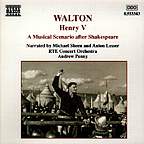 The music for Henry V was the 10th of Walton’s 15 film
scores. This Naxos recording is an adaptation by Christopher Palmer of the movie music,
with dramatic readings from Shakespeare's Henry V and Henry IV. The nine scenes carry us
through the world of Olde England: Falstaff at the Boar’s Head Inn, the noisy
embarkation of troops for France, the battle scene at Harfleur (“Once more into the
breach, dear friends”), and so forth, returning to the bustle of post-bellum London.
The musical jewel is Walton’s atmospheric Night Watch, well-played by the Irish RTE
Concert orchestra. The rest of the music is interesting but disjointed. There is so much
narration that it almost qualifies as an audio book. Movie music and theatre buffs will
definitely want this disc. The music for Henry V was the 10th of Walton’s 15 film
scores. This Naxos recording is an adaptation by Christopher Palmer of the movie music,
with dramatic readings from Shakespeare's Henry V and Henry IV. The nine scenes carry us
through the world of Olde England: Falstaff at the Boar’s Head Inn, the noisy
embarkation of troops for France, the battle scene at Harfleur (“Once more into the
breach, dear friends”), and so forth, returning to the bustle of post-bellum London.
The musical jewel is Walton’s atmospheric Night Watch, well-played by the Irish RTE
Concert orchestra. The rest of the music is interesting but disjointed. There is so much
narration that it almost qualifies as an audio book. Movie music and theatre buffs will
definitely want this disc.
Mozart : Opera and Concert Arias
Véronique Gens, soprano
Ivor Bolton / Orchestra of the Age of Enlightenment
Virgin 7243 5 45319 2 7
*** $$$
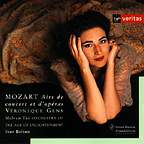 French soprano Véronique Gens is a fine young
singer well-suited to interpret Mozart arias with an original-instrument band like the
Orchestra of the Age of Enlightenment. Her voice is not huge and her timbre is more
pleasant live than on this recording, but she performs with musical conviction.
Unfortunately her Zerlina, Donna Elvira, and Countess all sound rather alike. The concert
arias are more successful. The pianoforte accompaniment by Melvyn Tan and the small
original-instrument band is pleasant. Compared to Kathleen Battle or Margaret Price’s
Mozart, Gens’s interpretations seem a bit anemic, but Mozart fans should still give
her a try. French soprano Véronique Gens is a fine young
singer well-suited to interpret Mozart arias with an original-instrument band like the
Orchestra of the Age of Enlightenment. Her voice is not huge and her timbre is more
pleasant live than on this recording, but she performs with musical conviction.
Unfortunately her Zerlina, Donna Elvira, and Countess all sound rather alike. The concert
arias are more successful. The pianoforte accompaniment by Melvyn Tan and the small
original-instrument band is pleasant. Compared to Kathleen Battle or Margaret Price’s
Mozart, Gens’s interpretations seem a bit anemic, but Mozart fans should still give
her a try.
Beethoven : Piano Concerto No. 5 & Violin Concerto
Jos van Immerseel, fortepiano / Vera Beths, violin
Bruno Weil / Tafelmusik (Sony SK 63365)
** $$$
This 1997 recording of Beethoven’s Piano Concerto No. 5 is a
big improvement over Tafelmusik’s dreary 1996 recording of the Beethoven Piano
Concertos Nos. 3 & 4 (SK 62824) with the same conductor, pianist, fortepiano, producer
and engineers. It would seem the new recording benefits from the acoustic of the Kursaal
in Bad Tölz. The fortepiano sounds clearer and less sticky, though Immerseel’s
fingering is still often sluggish and leaden. As before the bassoons are feeble, but the
band sounds louder, richer, better balanced, almost modern. The Violin Concerto is the
reason to get this disk. Vera Beth is an intelligent artist, getting the maximum out of
her Strad under difficult authentic conditions. The resulting performance is spontaneously
enjoyable, transcending the technical limitations of a period instrument band.
Exquisite Fires : musique de Linda Bouchard
Orchestre du Centre national des Arts
Trevor Pinnock et Derrick Inouye, chefs d’orchestre
Kevin McMillan, baryton
Marquis Classics EMI 81219
*** $$$
L’OCNA livre ici une superbe interprétation de cinq
œuvres de la très prolifique compositrice québécoise Linda Bouchard. Les Exquisite
Fires, qui sont en fait un tableau de neuf miniatures, m’ont particulièrement
impressionné. Non seulement les pièces sont-elles excellentes, mais la maîtrise que
démontre l’orchestre dirigé par Trevor Pinnock pour cette oeuvre du répertoire
contemporain s'avère tout simplement magnifique. Ce fait est encore plus surprenant
lorsque l’on sait que Pinnock se spécialise plutôt dans la musique des XVIIe et
XVIIIe siècles. C’est donc dire que la complicité qui existe entre ce dernier et
Bouchard, qui n’en sont pas à leur première collaboration, est des plus étroite.
La deuxième œuvre, Songs for an Acrobat, se démarque quant à elle par des rythmes
enlevants et l’utilisation de la voix. Divisée en huit miniatures s'appuyant sur des
textes de Maurice Tourigny, cette musique évoque des paysages, tantôt paisibles, tantôt
tapageurs, où l’amour et la mort s’entrecroisent. En somme, il s’agit là
d’un disque de grande qualité. -Jean-Claude Thériault
Prazak Quartet
Founded in 1972 by four students at the Prague Conservatory, the
Prazak Quartet is one of the best quartets in a country with no shortage of great ones.
They started touring in 1980 and managed to work outside of communist Czechoslovakia a few
times before the borders opened permanently in 1989. Since then their highly anticipated
appearances abroad have been more frequent, and they have made several triumphant Canadian
tours.
They have also made several exquisite recordings of the quartet
repertoire - ten early ones on Nuova Era and since 1994 about 15 on Praga for French
harmonia mundi. Their Praga recordings have won countless Chocs and Diapasons d’Or.
Their playing style is characterized by flawless intonation, rhythmic precision,
orchestral richness of sound, and structural clarity. Their Haydn, Mozart and Schoenberg
discs are good, but their Janácek, Schubert and Dvorak are even better. If I had to pick
just one quartet to hear live and on disc, the Prazak would be it. Don’t miss their
concerts in Montreal for Pro Musica on October 26 at Théâtre Maisonneauve (tel:
514-842-2112) and at Toronto’s Ford Centre on October 28 (tel: 416-324-9333).
Leos Janácek: String Quartets No. 1 & No. 2
Prazak Quartet (Praga PRD 250 108)
*** $$$
 This recording of Janacek’s two delicious
string quartets takes its place among the best of the dozen-plus versions in the
catalogue. Janacek’s String Quartet No. 1, inspired by Tolsoy’s novella The
Kreuzer Sonata, is a dramatic work full of Janacek’s typical picturesque local colour
and tragicomic sensibility. It is one of the masterpieces of programmatic writing, vividly
re-enacting the harrowing novella’s tale of adultery and murder. The Czechoslovakian
Prazak Quartet are masters of Janacek’s atmospheric string effects so often sadly
flubbed by western ensembles. Despite recorded sound that is slightly fuzzy and
over-reverberant (typical, alas, of many Prague recordings) this is a highly recommended
disc. This recording of Janacek’s two delicious
string quartets takes its place among the best of the dozen-plus versions in the
catalogue. Janacek’s String Quartet No. 1, inspired by Tolsoy’s novella The
Kreuzer Sonata, is a dramatic work full of Janacek’s typical picturesque local colour
and tragicomic sensibility. It is one of the masterpieces of programmatic writing, vividly
re-enacting the harrowing novella’s tale of adultery and murder. The Czechoslovakian
Prazak Quartet are masters of Janacek’s atmospheric string effects so often sadly
flubbed by western ensembles. Despite recorded sound that is slightly fuzzy and
over-reverberant (typical, alas, of many Prague recordings) this is a highly recommended
disc.
Mozart : Prussian Quartets K. 575, K. 589, K. 590
Prazak Quartet (Praga PR250-026)
*** $$$
None of these quartets, dedicated to the cello-playing King of
Prussia, are among Mozart’s best known, but the Prazak Quartet make everything they
interpret seem profound. As usual, the foursome play harmoniously, with a pure and
ethereal tonality, and a sprightly, umannered line. The recorded sound is clear, close and
balanced. An enjoyable disc with a generous 77 minutes of music.
J. S. Bach : Six Suites for Solo Cello
Pieter Wispelwey, cello
Channel Classics CCS 12298
*** $$$
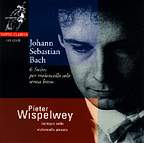 Dutch cellist Pieter Wispelwey’s second recording of
Bach’s complete cello suites confirms him as a brilliant but eccentric innovator, who
may just be on the verge of revolutionizing the way we think about cello playing. There
are as many ways of playing Bach’s suites as there are cellists, but Wispelwey makes
nearly every track of this 2-hour recording sound like it was written by a different
composer. In his notes, Wispelwey declares the need to “imagine these pieces as fresh
music, without the burden of interpretations, connotations amd obligatory
associations.” He not only plays the suites as fresh music, he all but rewrites them.
His phrasing in the prelude and allemagne of Suite No. 1 is so pointedly different from
any other, it is not just unfamiliar, it is almost unmusical. Bach rolls in his grave, but
Wispelwey plays on. The courante rushes at breakneck speed, punctuated by enormous slow
deep vibrant bow strokes that set the speakers humming. The acoustic of the Valkkoog
Church in Holland is exceedingly reverberant, making Wispelwey’s throbbing bow
strokes almost a parody of melodramatic technique. The raw sound is gorgeous, but the
vision is feverish, wilful, and slightly mad. Yet there is method to his madness. By the
end of the first suite, one is intrigued, by the end of the second, one is hypnotised. The
close miking captures every pant and grunt of Wispelwey’s effortful technique. With
this iconoclastic interpretation of Bach’s masterpiece, Wispelwey has set himself up
as the Glenn Gould of the cello. Hear Wispelwey play the complete Bach Suites on Oct. 18
at 2:30 p.m. at Toronto’s Ford Centre. Tel: 416-324-9333. Dutch cellist Pieter Wispelwey’s second recording of
Bach’s complete cello suites confirms him as a brilliant but eccentric innovator, who
may just be on the verge of revolutionizing the way we think about cello playing. There
are as many ways of playing Bach’s suites as there are cellists, but Wispelwey makes
nearly every track of this 2-hour recording sound like it was written by a different
composer. In his notes, Wispelwey declares the need to “imagine these pieces as fresh
music, without the burden of interpretations, connotations amd obligatory
associations.” He not only plays the suites as fresh music, he all but rewrites them.
His phrasing in the prelude and allemagne of Suite No. 1 is so pointedly different from
any other, it is not just unfamiliar, it is almost unmusical. Bach rolls in his grave, but
Wispelwey plays on. The courante rushes at breakneck speed, punctuated by enormous slow
deep vibrant bow strokes that set the speakers humming. The acoustic of the Valkkoog
Church in Holland is exceedingly reverberant, making Wispelwey’s throbbing bow
strokes almost a parody of melodramatic technique. The raw sound is gorgeous, but the
vision is feverish, wilful, and slightly mad. Yet there is method to his madness. By the
end of the first suite, one is intrigued, by the end of the second, one is hypnotised. The
close miking captures every pant and grunt of Wispelwey’s effortful technique. With
this iconoclastic interpretation of Bach’s masterpiece, Wispelwey has set himself up
as the Glenn Gould of the cello. Hear Wispelwey play the complete Bach Suites on Oct. 18
at 2:30 p.m. at Toronto’s Ford Centre. Tel: 416-324-9333.
Among Friends : Trios pour piano
Trio des Iscles
CMC Centredisques CMCCD-6098
** $$$
Un répertoire d’œuvres de compositeurs canadiens
interprétées par un trio français de haut calibre: voilà qui décrit bien ce disque.
Parmi les moments forts que l’on y retrouve, notons la pièce-titre du disque, Among
Friends , du compositeur Chan Ka Nin. Cette œuvre extrêmement variée, aux
sonorités imitant parfois des techniques propres à certains instruments orientaux,
s’est d’ailleurs méritée le 1er prix du Barlow International Chamber Music
Competition ainsi qu’un prix Juno en 1994. On retrouve aussi sur ce disque un trio de
Barbara Monk Feldman qui nous transporte dans un univers méditatif où les couleurs
instrumentales sont au centre des préoccupations du compositeur. Il s’agit en fait
d’une tentative pour exprimer à l’aide des sons les différents paramètres
propres aux arts plastiques. Les trois autres pièces, moins connues, n’en demeurent
pas moins intéressantes et brillamment rendues par le Trio des Iscles. En terminant,
notons qu’il est assez rare de voir un ensemble de l'extérieur enregistrer un disque
sur étiquette Centredisques. Toutefois, cette expérience est fort concluante.
-Jean-Claude Thériault
Tchaikovsky : Iolanta
Valery Gergiev / Kirov Opera Orchestra and Chorus
Philips 442-796-2
*** $$$
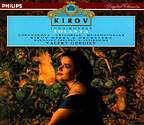 This is a good recording of Tchaikovsky’s final opera,
which tells the tear-jerking story of Iolanta, (daughter of KIng René of Provence) who
has been blind from birth but doesn’t know it. Her father the King has forbidden the
mention of sight, color and light in Iolanta’s presence, so she will not be aware of
her disability. One day Count Vaudémont happens upon Iolanta and falls in love with her,
revealing to her that she is blind. Love inspires her to want to see. The mysterious
eastern doctor Ibn-Hakia vows to cure her, if she truly wants to see. When Iolanta
recovers her sight, the King marries her to Vaudémont. All’s well that ends well.
The Kirov regulars are all in good voice on this recording. Gennady Bezzubenkov (Bertrand)
is a fine basso, Sergei Alexashkin (René) is a resonant baritone. Baritone Dmitri
Hvorostovsky takes the small role of Robert. Gegam Grigorian (Vaudémont) is a clean
forceful tenor, and Nikolai Putilin is thrilling as the philosophical Ibn-Hakai. Soprano
Galina Gorchakova in the the title role will not be to everyone’s taste. Her voice is
pleasant at low volumes, but when louder than mezzo-forte she sounds piercingly shrewish,
not the ideal timbre for the fairy tale’s virginal heroine. The Kirov Orchestra
always play impeccably for their master, Gergiev. The Philips engineers have mastered the
Mariinksy Theatre’s acoustical quirks, so orchestra and voices are carefully balanced
and cushioned. Tchaikovsky’s Iolanta will be performed in concert by the Canadian
Opera Company Oct. 16 at 8 p.m. at Toronto’s Ford Centre. Tel: 416-324-9333. This is a good recording of Tchaikovsky’s final opera,
which tells the tear-jerking story of Iolanta, (daughter of KIng René of Provence) who
has been blind from birth but doesn’t know it. Her father the King has forbidden the
mention of sight, color and light in Iolanta’s presence, so she will not be aware of
her disability. One day Count Vaudémont happens upon Iolanta and falls in love with her,
revealing to her that she is blind. Love inspires her to want to see. The mysterious
eastern doctor Ibn-Hakia vows to cure her, if she truly wants to see. When Iolanta
recovers her sight, the King marries her to Vaudémont. All’s well that ends well.
The Kirov regulars are all in good voice on this recording. Gennady Bezzubenkov (Bertrand)
is a fine basso, Sergei Alexashkin (René) is a resonant baritone. Baritone Dmitri
Hvorostovsky takes the small role of Robert. Gegam Grigorian (Vaudémont) is a clean
forceful tenor, and Nikolai Putilin is thrilling as the philosophical Ibn-Hakai. Soprano
Galina Gorchakova in the the title role will not be to everyone’s taste. Her voice is
pleasant at low volumes, but when louder than mezzo-forte she sounds piercingly shrewish,
not the ideal timbre for the fairy tale’s virginal heroine. The Kirov Orchestra
always play impeccably for their master, Gergiev. The Philips engineers have mastered the
Mariinksy Theatre’s acoustical quirks, so orchestra and voices are carefully balanced
and cushioned. Tchaikovsky’s Iolanta will be performed in concert by the Canadian
Opera Company Oct. 16 at 8 p.m. at Toronto’s Ford Centre. Tel: 416-324-9333.
Schubert : Complete Songs Volume 29
Marjana Lipovsek, mezzo. Nathan Berg, baritone.
Graham Johnson, piano
Hyperion Schubert Edition CDJ 33029
** $$$
Saskatchewan baritone Nathan Berg's recordings are hard to find in
Canada (two albums of Schoeck songs on Jecklin and Novalis are not distributed here). Berg
makes a cameo appearance on Volume 29 of Hyperion’s Complete Schubert edition,
singing the 19-minute song Einsamkeit. One gets an idea of his cavernous, virile
bass-baritone, but the song is monotonous and doesn’t display the colour and dramatic
range of Berg’s voice. The rest of the disc is sung by mezzo Marjana Lipovsek, who
has a big opera career singing Wagner. She scales down her voice to the requirements of
Schubert’s lieder and delivers some lovely songs. The highlight of the Schubert
edition is accompanist Graham Johnson’s notes, full of biographical minutiae about
Schubert’s love life. I can’t wait for the notes to be collected in book form.
Nathan Berg sings a recital with the André Turp Society Oct. 25 at 3 pm in McGill
University’s Redpath Hall. Call (514) 397-0068.
Bellini : Norma
Antonio Votto / La Scala (Gala Mono GL 100.511)
*** $$
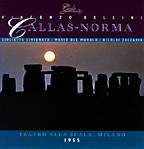 This pirate recording of the Italian radio
broadcast of the Dec. 7, 1955, La Scala Norma captures Callas at the height of her powers
in one of her trademark roles. Her Norma grew in depth and intensity since she first
performed it in 1948, and this recording is at least as good as her previous ones (Mexico
1950, London 1952, Trieste 1953, and EMI 1954). Pollione is sung by robust tenor Mario del
Monaco , to the delight of the enthusiastic Italian audience. Giuletta Simionato is a
strong Adalgisa and Nicolai Zaccaria an imposing Oroveso. The sonics are fairly good. No
libretto, and synopsis in English only. Previously available at twice the price on a
different label, this economical Gala re-issue is well worth having. Bellini’s Norma
continues at the Canadian Opera Company Oct. 3,6,9. Tel: (416) 363-8231. This pirate recording of the Italian radio
broadcast of the Dec. 7, 1955, La Scala Norma captures Callas at the height of her powers
in one of her trademark roles. Her Norma grew in depth and intensity since she first
performed it in 1948, and this recording is at least as good as her previous ones (Mexico
1950, London 1952, Trieste 1953, and EMI 1954). Pollione is sung by robust tenor Mario del
Monaco , to the delight of the enthusiastic Italian audience. Giuletta Simionato is a
strong Adalgisa and Nicolai Zaccaria an imposing Oroveso. The sonics are fairly good. No
libretto, and synopsis in English only. Previously available at twice the price on a
different label, this economical Gala re-issue is well worth having. Bellini’s Norma
continues at the Canadian Opera Company Oct. 3,6,9. Tel: (416) 363-8231.
Brahms : Violin Concerto
Nigel Kennedy, violin
Klaus Tennstedt / London Philharmonic
EMI CDC 754 187 2
*** $$$
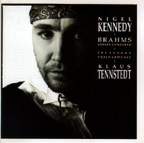 Recorded back in 1990 when Kennedy was at the height of his
controversial fame, his Brahms Concerto with the late, great Klaus Tennstedt is one of
Kennedy’s most satisfying album. Despite Kennedy’s iconoclastic appearance and
behaviour, his fiddle playing was always potentially superb. Here he tackles a cornerstone
of the violin repertoire and delivers a performance that deserves a place beside any in
the catalogue. Kennedy is not afraid to wear his heart on his sleeve, as his liner notes
for this album attest. “The main purpose of written music : the communication of
emotion,” he declares, and his lyrical, almost schmaltzy Allegro non troppo movement
is the proof. Elsewhere he is more reserved and commanding, sparing us the high jinks that
made Kennedy’s Four Seasons a best-seller. The London Symphony is brilliantly
supportive. Kennedy plays Toronto Symphony Orchestra performances of the Brahms Concerto
Oct. 14, 15, 17 at Roy Thomson Hall. Tel: (416) 593-4828. Recorded back in 1990 when Kennedy was at the height of his
controversial fame, his Brahms Concerto with the late, great Klaus Tennstedt is one of
Kennedy’s most satisfying album. Despite Kennedy’s iconoclastic appearance and
behaviour, his fiddle playing was always potentially superb. Here he tackles a cornerstone
of the violin repertoire and delivers a performance that deserves a place beside any in
the catalogue. Kennedy is not afraid to wear his heart on his sleeve, as his liner notes
for this album attest. “The main purpose of written music : the communication of
emotion,” he declares, and his lyrical, almost schmaltzy Allegro non troppo movement
is the proof. Elsewhere he is more reserved and commanding, sparing us the high jinks that
made Kennedy’s Four Seasons a best-seller. The London Symphony is brilliantly
supportive. Kennedy plays Toronto Symphony Orchestra performances of the Brahms Concerto
Oct. 14, 15, 17 at Roy Thomson Hall. Tel: (416) 593-4828.
J. S. Bach : Cantatas BWV 8, 125, 138
Philippe Herreweghe / Collegium Vocale
harmonia mundi HMC 901659
*** $$$
The latest disc of Bach cantatas from Herreweghe offers three
chorale cantatas (using a mixed choir) from 1723-1725, part of Bach's output of a cantata
for every Sunday and Feast Day of the litugrical year. The texts of these three cantatas
focus on death, though the music is surprisingly upbeat. The Collegium Vocale is a small,
refined choir of fresh young voices who give Bach an accessible, domestic face. The
soloists are unifrmly excellent. |